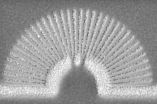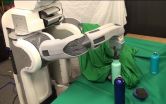BAMS article outlines 20-year process to create meteorological partnership between US and Cuba
2015-05-22
(Press-News.org) May 22, 2015 - Boston, MA - Few professions in the world benefit from the sharing of information as much as meteorology. Nearly all countries around the world realize the value of sharing meteorological data across their borders. This information collaboration is vital to scientific understanding of the atmosphere and the oceans, as well as essential for accurate forecasts and timely warnings of hurricanes, typhoons, and other severe weather.
But what about when one country maintains an active embargo with another country?
That question was answered last year, when the United States and Cuba began operating a newly installed Global Positioning Satellite (GPS) system in Camagüey, Cuba, designed to measure the amount of water vapor in the atmosphere above the region. Information collected at the facility is part of a wider Caribbean data collection effort known as COCONet, and is used as input to produce more accurate weather forecasts.
In a forthcoming article in the Bulletin of the American Meteorological Society (BAMS), authors Dr. Richard Anthes, President Emeritus at University Corporation of Atmospheric Sciences (UCAR) and Dr. Alan Robock, Professor at Rutgers University's School of Environmental and Biological Sciences, describe the two-decade-long process to form an active meteorological partnership with the Meteorological Institute of Cuba (their National Weather Service). They were joined by co-authors Drs. John Braun of UCAR, Oswaldo García of San Francisco State University, and two Cuban colleagues Juan Carlos Antuña Marrero and René Estevan Arredondo from the Grupo de Óptica Atmosférica de Camagüey.
Anthes, the 2007 AMS President, noted in the article that, "This success story in scientific cooperation has threads that date back over two decades." The article is a fascinating look into the politics, planning, and science behind installing a critically important tool in a country that has severely limited relations with the U.S. It also highlights the tremendous work being done to foster beneficial meteorological relations between the two nations long before recent political talks began.
While the U.S. and Cuba have shared meteorological information and data relating to hurricanes and other tropical storms starting as early as the mid-1800's, this is the first time a partnership of this level has been created; it included the shipping and installation of sensitive GPS monitoring equipment, something that would normally not be allowed by either government.
The article also highlights some of the complex and lengthy process necessary to get various approvals from both the United States and Cuban governments. Sometimes even more complicated were the efforts to bring all the various scientists themselves together in one room to plan for the partnership. At one point, Fidel Castro invited Robock to give a presentation in Cuba, and Castro himself participated, which helped promote a stronger partnership effort.
INFORMATION:
You can read the full BAMS article here:
http://journals.ametsoc.org/doi/pdf/10.1175/BAMS-D-14-00171.1
Media contact:
Tom Champoux
tchampoux@ametsoc.org
617-306-4282
Author contacts:
Dr. Richard Anthes
anthes@ucar.edu
303-519-5031
Dr. Alan Robock
robock@envsci.rutgers.edu
732-881-1610
ELSE PRESS RELEASES FROM THIS DATE:
2015-05-22
BUFFALO, N.Y. -- It looks like a Slinky suspended in motion.
Yet this photonics advancement -- called a metamaterial hyperlens -- doesn't climb down stairs.
Instead, it improves our ability to see tiny objects.
Described in a research paper published today by the journal Nature Communications, the hyperlens may someday help detect some of the most lethal forms of cancer.
It could also lead to advancements in nanoelectronic manufacturing and boost scientists' ability to examine single molecules -- a development with implications in physics, chemistry, biology and other ...
2015-05-22
WASHINGTON, D.C. -- Disaster investigators and emergency personnel may find themselves better able to assess and respond to terrorist attacks and industrial accidents with the aid of a new computational tool that determines the energy from explosions near the Earth's surface. As a first test of the new approach, its developers have analyzed a deadly explosion which reportedly killed dozens of regime soldiers in the Syrian civil war.
Computing the energy yield of an explosion just below, at, or above the ground poses difficult challenges, while deep-underground blasts ...
2015-05-22
New York, NY -- May 22, 2015 -- Working with researchers at Zhejiang University in China, Changxi Zheng, assistant professor of computer science at Columbia Engineering, has developed a technique that enables hydrographic printing, a widely used industrial method for transferring color inks on a thin film to the surface of manufactured 3D objects, to color these surfaces with the most precise alignment ever attained. Using a new computational method they developed to simulate the printing process, Zheng and his team have designed a model that predicts color film distortion ...
2015-05-22
(NEW YORK - May 22) - By comparing flu viruses to the virus that causes measles, researchers fine-tuned a tool that may enable faster vaccine design, according to a study led by Mount Sinai researchers and published online this week in the journal Cell Reports.
The study results revolve around viruses, which are designed perfectly by evolution to invade human cells, inject viral genes and use human genetic machinery to make copies of them. In an endless back and forth, human immune cells have evolved to recognize and attack viral surface proteins, and viruses to constantly ...
2015-05-22
(PARIS, FRANCE) Technique, talk, and talent were three buzzwords at the 2015 EuroPCR congress. As in years past, the conference featured a mix of breaking news, live case demonstrations, oral and poster sessions, debates, and tips-and-tricks tutorials. New study data have been increasingly showcased at EuroPCR and this year's meeting featured over 70 new abstract sessions throughout the four-day meeting, across five interventional tracks.
One of the focus topics at this year's meeting was a spate of recent trials showing a benefit for mechanical thrombectomy in acute ...
2015-05-22
URBANA, Ill. - The widespread evolution of herbicide-resistant weeds is costing farmers, especially through decreases in productivity and profitability. Although researchers and industry personnel have made recommendations to slow this evolution, an understanding of the patterns and causes of the resistance has been limited.
Diversifying the herbicide mechanisms of action (MOAs) has been recommended to stop the spread of herbicide-resistant weeds. MOAs refer to the biochemical interaction that affects or disrupts the target site in the weed. Two common methods of diversifying ...
2015-05-22
The first definitive summary of the best and safest blood pressure lowering treatments for kidney disease and diabetes patients has been compiled by New Zealand doctor and researcher Associate Professor Suetonia Palmer.
The international relevance of her work for doctors, patients and those who decide which drugs to fund has been demonstrated by the prestigious Lancet medical journal publishing an article on her study in its latest edition.
The University of Otago, Christchurch, researcher together with a global team used innovative statistical analysis to compare hundreds ...
2015-05-22
Berkeley -- Researchers at the University of California, Berkeley, have developed algorithms that enable robots to learn motor tasks through trial and error using a process that more closely approximates the way humans learn, marking a major milestone in the field of artificial intelligence.
They demonstrated their technique, a type of reinforcement learning, by having a robot complete various tasks -- putting a clothes hanger on a rack, assembling a toy plane, screwing a cap on a water bottle, and more -- without pre-programmed details about its surroundings.
"What ...
2015-05-22
WASHINGTON, D.C., May 22, 2015 -- Play a flute in Carnegie Hall, and the tone will resonate and fill the space. Play that same flute in the Grand Canyon, and the sound waves will crash against the rock walls, folding back in on each other in sonic chaos. The disparity in acoustics is clear - to the modern listener, the instrument belongs in an auditorium.
"Distinct echoes would be totally unforgivable in today's performance spaces," says Steven J. Waller, an archaeo-acoustician who has studied prehistoric rock art and the acoustics of ancient performance spaces. "But, ...
2015-05-22
WASHINGTON, D.C., May 22, 2015 -- The room is loud with chatter. Glasses clink. Soft music, perhaps light jazz or strings, fills the air. Amidst all of these background sounds, it can be difficult to understand what an adjacent person is saying. A depressed individual, brought to this cocktail party by a well-meaning friend, can slide further into himself, his inability to hear and communicate compounding his sense of isolation.
"A lot of research has suggested that these people with elevated depression symptoms have a bias towards negative perception of information ...
LAST 30 PRESS RELEASES:
[Press-News.org] BAMS article outlines 20-year process to create meteorological partnership between US and Cuba


